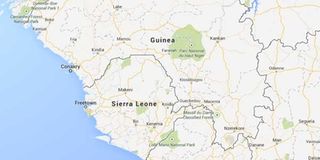Ebola outbreak in Guinea sparks health fears in West Africa

A map of Guinea.
What you need to know:
- The health ministry said three of 12 virus samples sent to France were confirmed as Ebola
- Until now, the virus has been known to be common in central and eastern Africa, notably in the Democratic Republic of Congo, Uganda, South Sudan and Gabon
Saturday`s confirmation of the Ebola virus as source of a mystery illness in Guinea has raised fears in neighbouring Sierra Leone. (READ: Guinea says Ebola source of epidemic)
The deadly outbreak of hemorrhagic fever last month is reported to have claimed the lives of close to 60 people in three districts in Guinea`s southern Forest region. And at least three separate cases were identified in the capital Conakry.
On Saturday the health ministry had reported 34 deaths from the illness and by Sunday, a further 25 had been added, news agency AFP reported.
Guinean experts had been unable to identify the highly contagious disease - whose symptoms include high fever, diarrhoea, vomiting and bleeding - since it was first recorded in February.
The health ministry said three of 12 virus samples sent to France were confirmed as Ebola, according to results they received on Friday.
"The Ebola fever epidemic raging in southern Guinea, including the prefectures of Gueckedou and Macenta, since February 9 has left at least 59 dead out of 80 cases identified by our services on the ground," said Sakoba Keita, chief disease prevention officer, according to AFP.
In neighbouring Sierra Leone, health officials have issued warnings urging the public to report any suspected cases.
It follows reports that the World Health Organization (WHO) said cases showing similar symptoms, including fever, diarrhoea, vomiting and bleeding, had been reported in an area around the southeastern district of Kailahun, which shares border with both Liberia and Guinea.
Sierra Leone's health ministry was investigating the case of a 14-year-old boy who died after exhibiting similar symptoms in the district, the country`s Chief Medical Officer, Dr. Brima Kargbo, told Reuters.
The victim is said to have fallen sick after returning from a village in Guinea where he'd attended the funeral of another victim.
NO TREATMENT
Dr Kargbo said a medical team had been dispatched to the area to conduct tests on family members who may have come in contact with the boy.
WHO, which also suspects laser fever, has reportedly sent experts who were due to arrive in Conakry on Sunday to conduct additional tests.
The Ebola virus is said to be one of the most virulent pathogens in existence, with a fatality rate of up to 90 per cent.
It has no treatment or vaccine and the virus is transmitted by direct contact with bodily fluids, including blood, faeces or sweat, or by sexual contact.
Health workers are also at risk if they improperly handle contaminated victims.
Until now, the virus has been known to be common in central and eastern Africa, notably in the Democratic Republic of Congo, Uganda, South Sudan and Gabon.
Therefore, experts have warned that since Guinea has never experienced an outbreak of this nature, it might pose a big problem as health officials may not know how to handle suspected cases.
The Guinean health ministry also said it was expecting an expert from Senegal to help in efforts to handle the situation.




